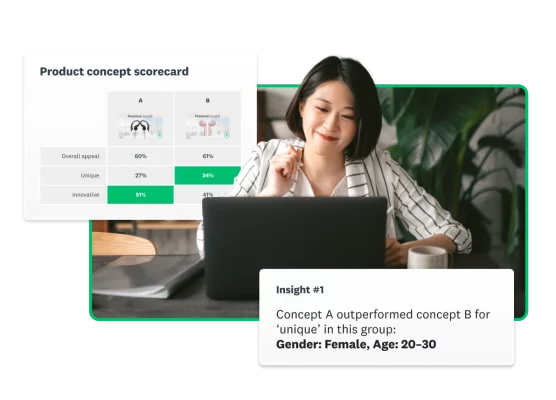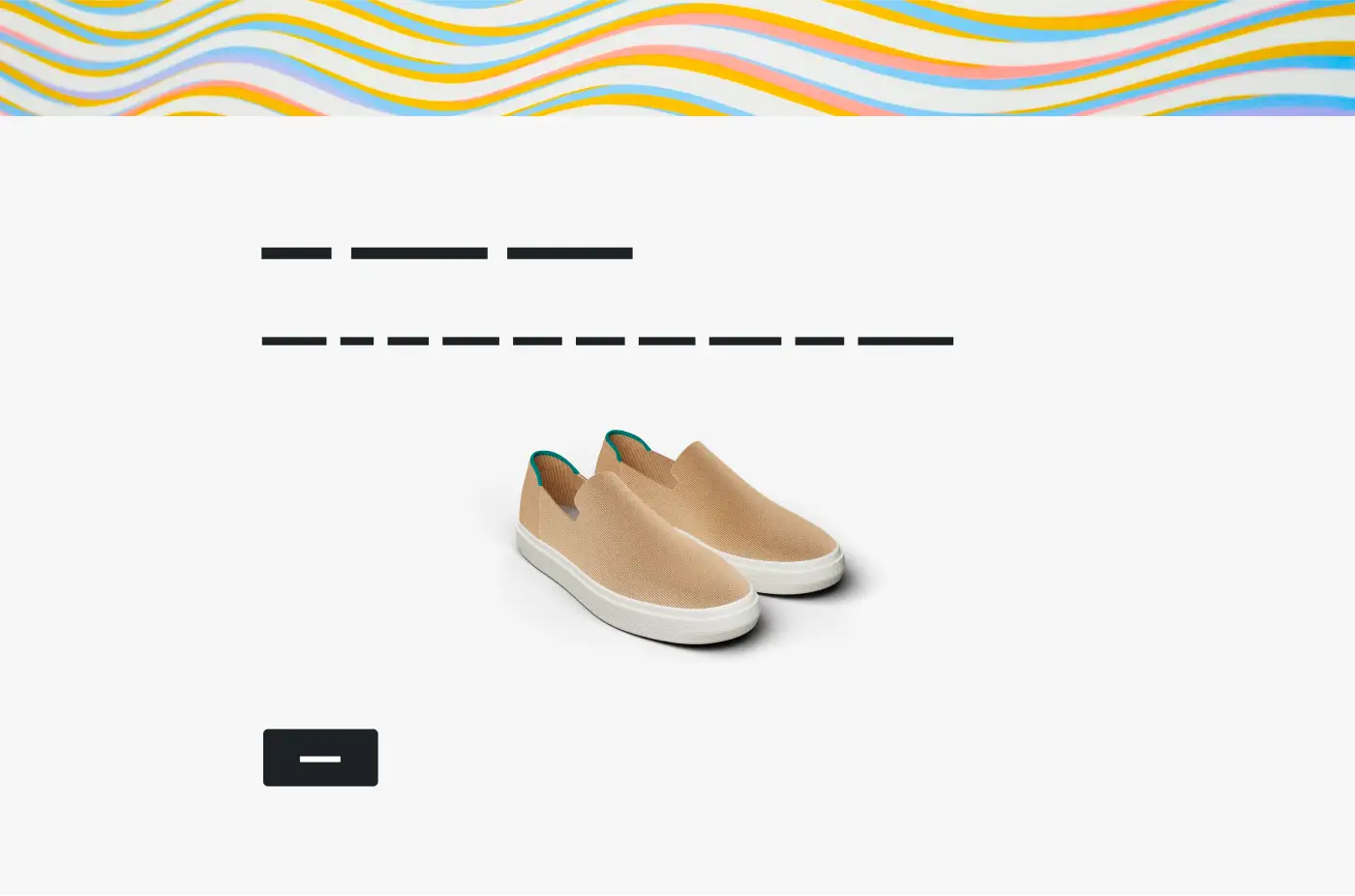Concept testing: methods and examples
Learn what concept testing is and why it’s essential for launching successful products, campaigns, or messages.

When you have a big idea that you want to get right, it can save you a lot of time and money to concept test it before you bring it to the world. Concept testing allows you to refine a product concept, ad campaign, new logo, or even a landing page by getting feedback directly from your target market. It can be as simple and quick or iterative and sophisticated as you need.
What is concept testing?
Concept testing is a market research method that helps you evaluate whether a product, message, or campaign will resonate with your target audience. By testing early—before a full launch—you reduce the risk of failure and gain insights that shape development.
You can test a single idea or compare multiple concepts (such as in an A/B test) to see which performs better. Results help refine your offering and provide data to support internal decision-making.
Surveys are the primary tool for gathering feedback in concept testing. They allow you to reach your target demographic through online panels and collect input on how people perceive your idea. Whether you're testing a message, product design, or visual asset, surveys make it easy to gather structured, actionable feedback in a consistent format.
Benefits of concept testing
Increased profitability and retention
Unfortunately, the consequences of pursuing a bad idea are often significant.
A bad idea leads your business to a negative reputation, which heavily influences your organization’s ability to grow or remain stable. For example, hiring becomes 10% more expensive when a company has a bad reputation, while the cost of retaining workers grows by more than 20%. And when your bad idea impacts a customer’s experience? 95% will share it with others, deterring prospects from purchasing your products or services.
Reduced mistakes
Companies of all shapes and sizes are vulnerable to making mistakes if they don’t test their ideas first. Below are specific examples and a study showing that when a bad idea moves forward, it can be costly.
Expensive advertising: Companies that publish annoying online ads pay $.153 more per ad displayed. Given the number of times an ad gets shown can quickly become expensive.
Ineffective package and logo designs: Package design can make or break product sales. Cigarette maker Marlboro, for example, was mandated by the Australian Government to stop using its logo and typeface on its packaging. This contributed to the most significant decline in Australia’s purchase and consumption of cigarettes in 20 years
Logo designs can cost brands millions of dollars. This makes the prospect of failure all the scarier. As a modern-day example, BP (a Britain-based oil and gas company) spent 136 million pounds on a new logo that’s been widely controversial.
Boosts company-wide buy-in
Do you ever have ideas that you’re confident will work but can’t get buy-in from your team? Proving that an idea is popular with consumers can convince your team to pursue it. After all, if consumers in your target market like it, who’s to say it won’t work?

Concept testing seems essential for marketers and product managers. But how do they feel about it? To find out, we went ahead and surveyed them directly, finding:
- Seventy-two percent of advertising professionals said it’s essential to test an ad before it’s launched. Doing so can make the ad more successful, they said, because effective ads stem from an in-depth understanding of what consumers want (and what they don’t).
- Product-focused managers strongly agreed: 85% said testing is vital to their success at work.
Despite their importance on testing, less than half of those we polled actually conduct concept tests. Creating your test may be a significant opportunity to get a leg up on the competition.
You can also widen your competitive advantage by improving your ability to write surveys. For help writing survey questions, check out our post on eliminating order bias. And before you look at your survey responses, learn about Top 2 Box scores.
Concept testing methods
There are four standard methods for concept testing. They are based on the number of ideas you want to evaluate.
Comparison testing
This method is also called comparative testing and is used to determine how multiple concepts measure against each other. Survey respondents are usually asked to rate each concept against specific criteria. Another way to perform comparison testing is to use ranking questions or to ask precise questions to determine which concept features are preferred.
Monadic testing
In monadic testing, you break your target audience into smaller groups. Each group tests one product feature and provides feedback. There is no comparison between concepts, simply an evaluation of features. Questions such as, “Does this concept provide value for the money?” are common in this type of testing.
Sequential monadic testing
Again, the target audience is broken into groups. Each group evaluates the concepts in a random, rotating sequence. Everyone in the target audience should get the chance to examine all of the presented concepts and provide feedback. Each group responds to the same set of questions at the end of the rotation.
Proto-monadic testing
A combination of sequential monadic and comparison testing, proto-monadic testing asks participants to examine concepts, compare features, and choose the best fit at the end of the rotation.
Concept testing survey design
When you’re ready to test your concepts, there are four steps to follow:
- Choose the best methodology for your application
Consider how much time you have, whether you are testing more than one feature, and which methodology will yield the best results.
- Set an objective
Consider the motive of the test and the information you want to gain from your customers. This will be your objective. Keep that in mind when designing your survey questions to gather the necessary data.
- Choose survey components appropriately
Carefully consider what components will make your questions clear to respondents and yield the desired data.
Likert scales provide an odd number of answer choices with a scale that might range from “strongly disagree” to “strongly agree.” These questions are easy to answer and the data they yield is easy to collect and analyze.
Images are necessary if you ask participants to provide feedback on a visual idea. For example, logo texting must include images rather than just text descriptions. Provide the photos of the different logos and ask participants which one they like best or to rank them.
Demographic questions are necessary for any concept testing to ensure that participants are part of your target audience. You want to know if your idea will be successful with your ideal customers.
- Identify the most promising concept
A high-level review of your collected data to identify the concept favored by your target market. Using your SurveyMonkey dashboard, you can dive deeper into each concept and find out what features tested well and failed—and why.
Concept testing use cases
How can you apply concept testing methods? We’re glad you asked! All sorts of business challenges can be solved with the right testing. Here are a few examples:
Logo testing
Need to understand how customers might respond to your new logo? Or, trying to figure out if your new logo communicates a benefit (like trust, innovation, or fun)? Online surveys are a great way to test different creative concepts and designs—to ultimately develop a logo that best visually communicates your brand.

To help you brainstorm your survey questions, check out our survey-methodologist approved Logo Testing Survey Template.
Don't want to create your own logo testing survey? Learn more about how SurveyMonkey's Logo Design Analysis makes it simple to get fast, impactful feedback about your logo designs.
Website design
Redesigning your site or launching a new one? Sharing your design concepts with people who will one day interact with them is a great way to see what a sample of your target population thinks—and of course, make sure you get everything right.
Before you begin collecting feedback on your website, take a look at the questions from our Website Feedback Survey Template.
Ads, landing pages, and conversions
Many online marketers test headlines, images, and content on their websites to identify winning combinations of messages and designs. Which ad tends to grab the most eyeballs? Is the ad compelling enough to click on? And do the people who click become customers soon after? This method of testing can give your conversion rate optimization efforts a real boost.
Move beyond the numbers and hear from individuals directly. Their feedback might push you in a new direction you hadn’t anticipated or validate what the numbers you already have to tell you. If you need help brainstorming, our Ad/Copy Testing Survey Template can help you ask the right questions.
Get fast, reliable feedback on your ad concepts without having to set up your own survey with our Ad Creative Analysis.
Pricing and upgrades
Planning to offer consumers an incentive for upgrading to a new product or service? Thinking about a new pricing system? Use migration path tests to assess initial reactions, and spot the key features and benefits consumers are looking for. Then, develop upgrade tests to see if your new product line will result in a boost in sales.
Name testing
The name of your company or product has a big impact on its success in the target market. It tells them what you offer, the benefits they can expect to receive, and can even elicit certain feelings. To help you test brainstorm the right questions for testing either company or product names, check out our Name Testing Survey Template.
SurveyMonkey's Brand Name Analysis can get you crucial feedback from your target market on your brand name, without having to spend time on survey design.
Price Testing Survey Template
How price-sensitive are consumers in your target market? And are they typically satisfied or dissatisfied with the value of products in your category? Find out with our Price Testing Survey Template.
Package testing
Learn what your packaging tells consumers about your product. Assess if it’s unique, visually appealing, and considered high quality by your target audience with our Package Testing Survey Template.
Get high-quality feedback on your packaging designs, without going through the trouble of creating a survey with SurveyMonkey's Packaging Design Analysis.
Messaging
Will your messaging resonate with your target audience? Does it effectively communicate the value your product or services have to offer? And is it believable? Ask your target audience to know for sure. It may also be worth checking with employees to see if they both understand and incorporate your messaging into their day-to-day work as well.
Find out if your messaging and claims resonate with your target audience quickly and effectively, with SurveyMonkey's Messaging and Claims Analysis.
Examples of concept testing
New product concept testing is used by some of the most successful businesses worldwide. Let’s look at some product concept testing examples from some of those companies.
Tesla
When Tesla launched its Model 3 in 2017, participants were presented with the concept and an opportunity to put down a deposit on one of their own.
The feedback allowed the company to raise an additional $400 million from investors.
Lego
Lego invested in concept testing to reach young girls, a market they were not attracting with their traditional building sets. Their concept testing revealed that girls wanted to create full environments rather than stand-alone structures.
Lego used these insights to design Lego Friends, a successful line of building sets that caters to a female demographic.
Yamaha
Yamaha is a global manufacturer of musical instruments. When they were designing their Yamaha Montage keyboard, they used concept testing to find out if their customers would prefer knobs or sliders for adjustments. They managed to collect valuable data quickly and accurately to inform their decision to use sliders.
Product and concept development
Find out which features a product should include, and which ones add nothing to your bottom line. This often involves determining the manufacturing quality of your product and understanding its ease of use. Use product concept and usability tests to ensure your product meets customers’ expectations.
Before you launch your survey, read about the best ways for asking product-specific feedback. Also, check out our survey methodologist-approved, Market Research Product Survey Template.
If this all sounds too time-consuming for your product testing project, our Product Concept Analysis solution can help you get feedback about your product concept, without having to design a complex survey.
Are you ready for concept testing?
Concept testing can be used for new products, features, logos, advertisements, and more. Before you move forward, find out what works—and what doesn’t. Get started now with the SurveyMonkey Concept Testing solution.
And be sure to explore our flexible market research solutions that incorporate guided methodologies such as concept testing and AI-Powered insights that reveal trends—fast.
Top templates

Market Research — Product Survey Template
Ensure a successful product launch with feedback from customers.

Market Research — Service Survey Template
Define target markets, measure brand awareness and grow your customer base.

Website Feedback Survey Template
Find how why users do what they do when they visit your site.

Work life balance survey template
Discover more resources

Understand your target market to fuel explosive brand growth
Brand marketing managers can use this toolkit to understand your target audience, grow your brand, and prove ROI.

See SurveyMonkey in action: Event registration and feedback

Hornblower enhances global customer experiences
Discover how Hornblower uses SurveyMonkey and powerful AI to make the most of NPS data, collect customer insights, and improve customer experiences.

Marketing trends: 3 strategies to stay relevant and ready for what's next
New SurveyMonkey research reveals critical insights on the state of marketing. Discover marketing trends to fuel your strategies and stay relevant.